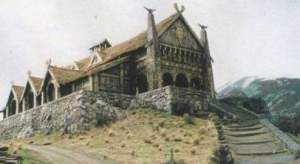 In Ephesians 2, Paul declares that we as Christians are the “workmanship of God”:
In Ephesians 2, Paul declares that we as Christians are the “workmanship of God”:
“For we are his workmanship, created in Christ Jesus for good works, which God prepared beforehand, that we should walk in them” (Eph. 2:10).
Interestingly, just a verse earlier, Paul reminds us of the sobering reality that we are saved by grace through the gift of faith, not the strength of our own theological prowess or pull-myself-up-by-my-bootstraps, “can-do” optimism. There is no amount of self-help literature, meditative yoga, or American patriotism that can yank us out of the muck of our depravity. We are just plain sunk. Apart from him I can do nothing (John 15:5).
So how are we to read this declaration that we are God’s workmanship? If all the good in us comes from grace, what does this identity mean? Are we valuable? As Joe Rigney once said, “I know God loves me, but does He like me?”
It’s notable that the Greek word rendered as “workmanship” here in Ephesians is poiema, from which we can clearly see our English word poem. When Paul encourages the church at Ephesus that they are “God’s poiema” created “in Christ Jesus”, we must recall what the Apostle John called Christ at the beginning of his gospel: the Word (“In the beginning was the Word…“).
So, quite truly and wondrously, we are the poetry of God created by the Word of God. We are His poiema created in Christ Jesus for good works. One cannot help but remember the glorious image of the great lion Aslan, singing all of Narnia into existence, creating from nothing the majestic symphony of space, the living splash of Nature’s color, the taste of golden water and the scent of purple skylines. All of creation, with man and woman as its crown jewels, is woven together into a grand and passionately wild poem by the even grander and wilder God who penned it. The ink of God’s poetic effort is the living and breathing dreams and glories of man. We are God’s poiema created in Christ Jesus. Majesty upon majesty.
As David wrote in Psalm 19:
“The heavens declare the glory of God,
and the sky above proclaims his handiwork.
Day to day pours out speech,
and night to night reveals knowledge.
There is no speech, nor are there words,
whose voice is not heard.
Their voice goes out through all the earth,
and their words to the end of the world.
In them he has set a tent for the sun,
which comes out like a bridegroom leaving his chamber,
and, like a strong man, runs its course with joy.”
The poetry of God flames out through all the earth. Observe the fullness of His glory as it is declared in this passage: the sun comes out like a bridegroom, coming for his bride, running his course with joy. Every sunrise, then, is a beautiful picture of the Great Bridegroom pursuing His bride down the cosmic aisle of the skies and clouds, chasing after her well into the night (as every groom ought).
As Victorian poet Gerard Manly Hopkins puts it:
“The world is charged with the grandeur of God / It will flame out like shining from shook foil”
All of creation is charged with God’s grandeur, an electric livewire coursing deep into our veins. We are not a dull, lifeless poem, stuck in the pages of a bedraggled, spine-torn anthology in my English classroom. We are a living, spoken, adrenaline-pumping poem uttered by the very breath of God. We are His workmanship, His craft, the diamonds carved from coal, man from dust, woman from bone.
So, yes. God likes us. We are His poem. God passionately pursues us and love us because we are crafted by His hands and His Word, made in His very image. We are the clay of a dedicated, careful Potter. We are the rhymes and notes of a marvelous Poet. We are His workmanship, created in Christ Jesus. May we learn to live this way.
As Doug Wilson once noted, it is no wonder the first recorded words of human history were poetry: “This at last is bone of my bones and flesh of my flesh” (Gen. 2:23).

 In an age of rampant cynicism, intense narcissism, and deep defiance toward absolutes such as truth, goodness, and beauty, the ache for passionate and rich festivity must burn ever more feverishly in our hearts. This sour world, lost in the mirrors of its vanity and drowning in the white noise of feeds, posts, snaps, and late-night binges, is in dire need of a good feast, what Tolkien saw as an evening by the fire, filled with boisterous laughter and great dancing. Or, as Lewis saw, what greater way to herald the breaking of winter than the carousing of creatures at the coming of spring? The promise of resurrection is a great promise, full and strong, breaking like the tide against this screen-drunk land.
In an age of rampant cynicism, intense narcissism, and deep defiance toward absolutes such as truth, goodness, and beauty, the ache for passionate and rich festivity must burn ever more feverishly in our hearts. This sour world, lost in the mirrors of its vanity and drowning in the white noise of feeds, posts, snaps, and late-night binges, is in dire need of a good feast, what Tolkien saw as an evening by the fire, filled with boisterous laughter and great dancing. Or, as Lewis saw, what greater way to herald the breaking of winter than the carousing of creatures at the coming of spring? The promise of resurrection is a great promise, full and strong, breaking like the tide against this screen-drunk land.
 In Ephesians 2, Paul declares that we as Christians are the “workmanship of God”:
In Ephesians 2, Paul declares that we as Christians are the “workmanship of God”:
 It is true that we are all characters in the great Story of God, called to our own journeys as we navigate the treacherous waters of a perilous world. It is also true that the dividing line between our actions in these journeys can be as thick as lead, the difference between noble Reepicheep, sailing into the majesty of Aslan’s country, and the self-absorbed Eustace, inching steadily toward the dragon’s den. Some are brave, some are weak.
It is true that we are all characters in the great Story of God, called to our own journeys as we navigate the treacherous waters of a perilous world. It is also true that the dividing line between our actions in these journeys can be as thick as lead, the difference between noble Reepicheep, sailing into the majesty of Aslan’s country, and the self-absorbed Eustace, inching steadily toward the dragon’s den. Some are brave, some are weak.
